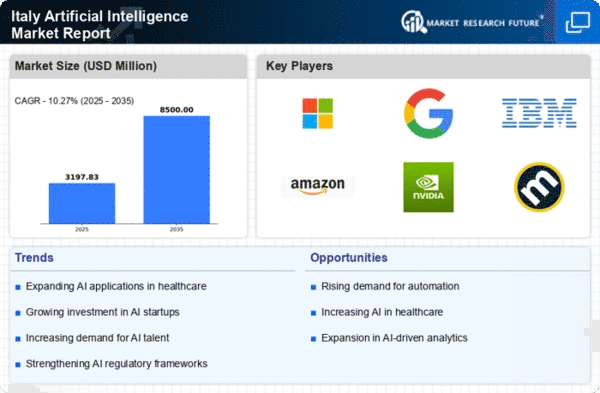Rising Demand for Automation
The artificial intelligence market is experiencing a notable surge in demand for automation across various sectors. Industries such as manufacturing, logistics, and retail are increasingly adopting AI technologies to enhance operational efficiency and reduce costs. According to recent data, the automation sector is projected to grow by approximately 15% annually, driven by the need for streamlined processes and improved productivity. This trend indicates a shift towards integrating AI solutions that can perform repetitive tasks, allowing human workers to focus on more complex responsibilities. As businesses recognize the potential of AI to optimize workflows, the artificial intelligence market is likely to expand significantly, fostering innovation and competitiveness within the Italian economy.
Government Initiatives and Funding
The Italian government is actively promoting the development of the artificial intelligence market through various initiatives and funding programs. In recent years, substantial investments have been allocated to support AI research and development, with a focus on fostering collaboration between public institutions and private enterprises. For instance, the government has earmarked over €1 billion for AI-related projects, aiming to position Italy as a leader in AI innovation. These initiatives not only enhance the technological landscape but also create a favorable environment for startups and established companies to thrive. Consequently, the artificial intelligence market is poised for growth, driven by supportive policies and financial backing from the government.
Emergence of AI in Financial Services
The financial services sector in Italy is rapidly embracing artificial intelligence technologies to enhance customer experiences and streamline operations. AI applications are being utilized for fraud detection, risk assessment, and personalized financial advice, leading to improved efficiency and customer satisfaction. Recent data suggests that the adoption of AI in financial services could lead to cost savings of approximately 25% for institutions, as automated systems handle routine tasks more effectively. This trend highlights the potential for AI to transform the financial landscape, making services more accessible and tailored to individual needs. As financial institutions continue to invest in AI solutions, the artificial intelligence market is expected to grow, driven by the demand for innovative financial products and services.
Increased Adoption of AI in Healthcare
The healthcare sector in Italy is witnessing a transformative shift with the increased adoption of artificial intelligence technologies. AI applications are being utilized for diagnostics, patient management, and personalized treatment plans, significantly improving healthcare outcomes. Recent studies indicate that the integration of AI in healthcare could reduce operational costs by up to 20%, while enhancing the quality of care provided to patients. This trend reflects a broader movement towards data-driven decision-making in healthcare, where AI systems analyze vast amounts of data to assist medical professionals. As the demand for efficient healthcare solutions rises, the artificial intelligence market is likely to expand, offering innovative tools that address the challenges faced by the healthcare industry.
Growing Interest in AI Education and Training
As the artificial intelligence market continues to evolve, there is a growing interest in education and training programs focused on AI technologies in Italy. Universities and educational institutions are increasingly offering specialized courses and degrees in AI, machine learning, and data science. This trend is essential for developing a skilled workforce capable of meeting the demands of the AI industry. Recent reports suggest that enrollment in AI-related programs has increased by over 30% in the past year, indicating a strong commitment to fostering talent in this field. By equipping individuals with the necessary skills, the artificial intelligence market is likely to benefit from a robust pipeline of professionals ready to drive innovation and growth.
















